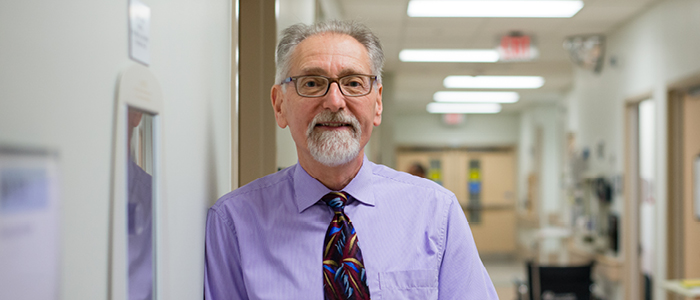Partner in research: Philip Doyle, PhD

There are moments in our lives that leave us changed forever. Philip Doyle, PhD, experienced one of these moments upon meeting his first patient as a young student clinician.
The middle-aged man was a cancer survivor who no longer had a voice box, appeared depressed, and had no support systems in place. It was this encounter that made Doyle realize he wanted to work with people with head and neck cancer, and help them in whatever way he could.
For the past 30 years, Doyle has dedicated a large portion of his research to the areas of voice abnormalities, secondary to treatment for laryngeal cancer, and quality of life issues for people with head and neck cancer.
Doyle, a Professor and Senior Research Scientist, is cross appointed to the Department of Otolaryngology – Head and Neck Surgery, a Professor of Rehabilitation Sciences, and Communication Sciences and Disorders, with the Faculty of Health Sciences, and the Director of the Voice Production and Perception Laboratory and the Laboratory for Well-Being and Quality of Life in Oncology at Western University.
While the head and neck cancer population is relatively small in numbers, it is increasing dramatically. Patients are now younger, some in their late 20s and early 30s, and generally healthier than those living with other forms of cancer. The current treatments are devastating, with immediate concerns for patients centred around the ability to speak, eat and swallow.
Meanwhile, the impact and consequences of treatment can lead to disfigurement, loss of ability to communicate verbally, distress, depression, and poor body image. “The impact of the treatments cuts across the board from physical to psychological to social,” said Doyle, adding that because the patients are younger they may live for many years post treatment, making this work so important.
“Our goal is to focus on areas of functioning that really impacts peoples’ ability to live a normal life, as much as possible, after they have been treated,” Doyle said.
Current research is focusing on body image concerns for people treated with head and neck cancers. There can be substantial changes in facial appearance after surgery creates immense limitations for patients and the stigma can be significant. Doyle’s team’s research is investigating how body image for these patients influences their psychological and social well-being.
Past research projects have spun-off into different opportunities leading Doyle’s team to new areas of investigation.
One such project focused on the level and impact of patient and caregiver distress and how it may alter at time of diagnosis, a year post diagnosis and throughout treatment.
They found that the shared distress was equal between the caregiver and the patient. The finding was followed with a consideration focused on screening for levels of distress to allow for intervention at specific points throughout the journey.
Doyle is grateful to Dr. Yoo’s open-mindedness, investment and support in this quality of life work. “There’s a shared and strong commitment to patient advocacy in this Department,” said Doyle, emphasizing the keen awareness the surgeons have of communication apprehension, body issues, and distress that their patients deal with throughout diagnosis and treatment.
“The folks here are compassionate, energetic and open-minded, and there is willingness to look at things that aren’t typical.”
The strong culture of research within the Department has created an opportunity to pair Doyle’s graduate trainees with residents. “The ability to connect people from different educational backgrounds, who have different career goals but who share a common commitment to improving the lives of patients, has been an unexpected but significant achievement of the involvement of this research in the Department,” he said.
Throughout his career, Doyle has supervised more than 80 graduate trainees and mentored numerous medical students and surgical residents on a variety of projects. Through this mentorship he has learned patience and benefitted from his trainees’ youthful brilliance and enthusiasm.
The patients he has worked with have taught him how to live his life.
“I was in my 20s when I first started my clinical placements, and since then I have always asked to work with cancer patients,” he said. “They are my motivation and inspiration; they all taught me about living my life to the fullest.”









